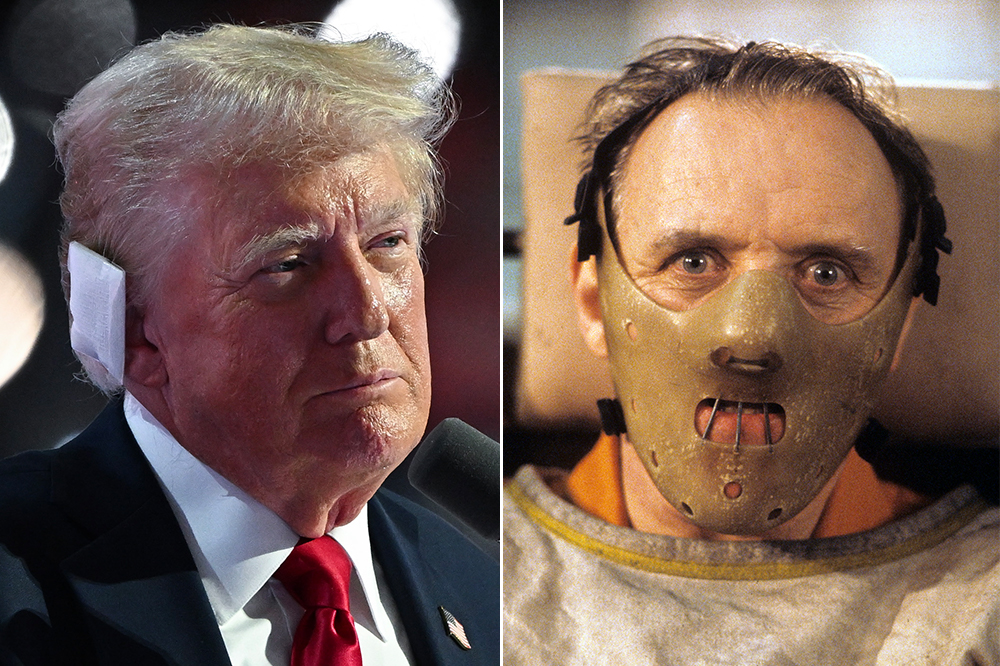The intersection of politics and pop culture: Donald Trump’s fascination with Hannibal Lecter
A new chapter in Trump’s political narrative
For a moment, it seemed as though Donald Trump had undergone a transformation. The final night of the Republican National Convention was filled with speeches that painted the 45th president as a unifier, a man changed by the attempt on his life. Tucker Carlson, the former Fox News anchor, emphasized this point, stating, “He turned down the most obvious opportunity in politics to inflame the nation after being shot. In the moment, he did his best to bring the country together.”
The unexpected mention of Hannibal Lecter
However, deep into Trump’s speech, he veered off into an unexpected territory, bringing up Hannibal Lecter from “The Silence of the Lambs.” “The press is always on me, because I say this,” Trump began, acknowledging that it wasn’t the first time he had mentioned the character. “Has anyone seen ‘Silence of the Lambs’? The late, great Hannibal Lecter. He’d love to have you for dinner.”
This wasn’t just a random pop culture reference. Trump’s fascination with Anthony Hopkins’ portrayal of Hannibal Lecter has been a recurring theme. He referred to Lecter as a “wonderful man” in May, quoting the character’s infamous line about having a friend “for dinner.”
The power of movies in political discourse
Great movies have the power to bring people together, and Trump’s use of popular culture during the convention was evident. The night featured a performance by Hulk Hogan and a musical act by Kid Rock, followed by UFC CEO Dana White introducing Trump. Yet, Trump’s reference to Hannibal Lecter was more than just a nod to a popular film; it was a metaphor for his views on crime in America.
Trump’s evocation of Lecter was used to highlight his belief that crime is rampant in the country, suggesting that potential Lecters, including immigrants he would deport, live among us. This imaginative capacity, while childlike, underscores Trump’s struggle to differentiate between fiction and reality. His entire professional life has been a build-up to a star turn, given his fascination with media and culture. In this context, Hannibal Lecter becomes another character in Trump’s narrative, a potential threat crossing the border.
Trump’s love for big, broad entertainment
Trump’s appetite for popular films is one of his most relatable qualities. In a 1997 New Yorker profile, a writer accompanied Trump on a plane and noted that he only watched the highlights of the Jean-Claude Van Damme film “Bloodsport,” focusing on the most violent fights. This preference for big, broad entertainment explains why the parts of “The Silence of the Lambs” that Trump remembers are Hannibal’s antics and his memorable quotes.
The imagined adversary
Hannibal Lecter is a supervillain—cunning, with inhuman appetites and a unique way with words. For Trump, Lecter represents the perfect adversary, matching his own perceived heroism and cleverness. In Lecter, Trump finds a villain whose monstrosity aligns with his narrative of fighting against any threat, real or imagined.
The reflective closure
If Trump’s debate against President Biden felt unsatisfying or too easy, there’s always the imagined challenge of hunting down Hannibal Lecter crossing the border. Perhaps those who fear a Trump restoration should be relieved that some of his focus is on Hannibal, and that the lambs have not yet stopped screaming.
For more insights into the characters and films mentioned, you can watch the trailers and find additional information here:
Trump’s fascination with Hannibal Lecter offers a unique lens through which to view his political narrative, blending reality with the world of cinema in a way that only he can.

 Italian
Italian







